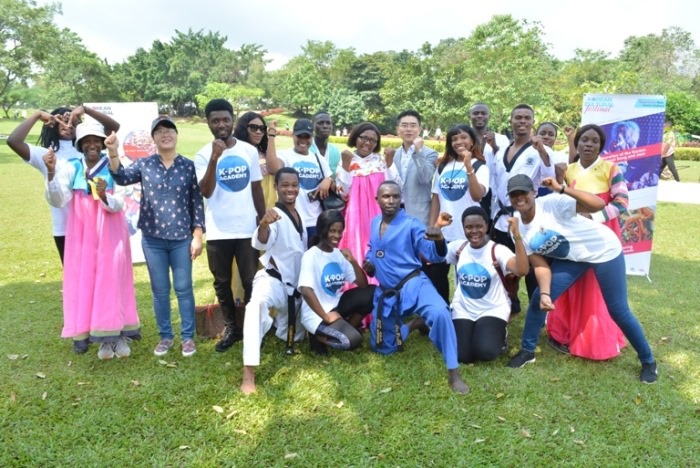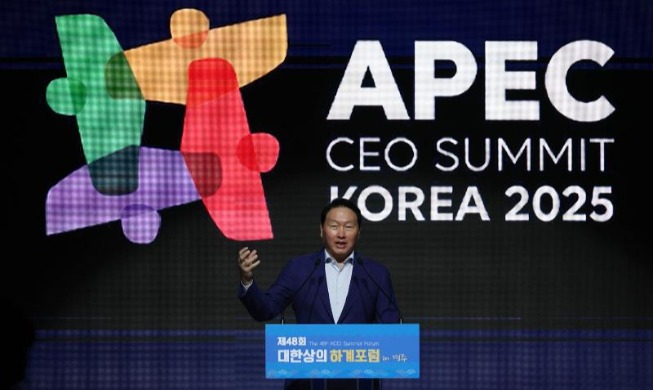- 한국어
- English
- 日本語
- 中文
- العربية
- Español
- Français
- Deutsch
- Pусский
- Tiếng Việt
- Indonesian
By Honorary Reporter Tedunjaiye Oluwatobi Motunrayo from Nigeria
Photo= Korean Cultural Center Nigeria

In May 2010, the first Korean Cultural Center (KCC) in Africa was established in Abuja, Nigeria, thus this year marks the 10th anniversary of its opening. Over the past decade, the KCC has fostered cultural relations between Korea and Nigeria by introducing Korean culture in the African country through programs, events and activities.
To mark the anniversary, I interviewed the KCC in Abjua's director Lee Jin-su on how the center has fared, its plans for Nigeria and his experience as a Korean in the country.
Give a brief introduction of yourself.
Having taken over as director last year on Feb. 23, I want to meet as many Nigerians as time permits and find out what they want in Korean culture by listening to them. Then I will actively reflect those ideas when promoting cultural exchange projects between the two countries.
In what ways has the KCC promoted Korean culture in Nigeria?
The KCC here promotes cultural events in the hope of becoming a mecca for spreading our culture in Africa. More than 20 events have been held in the past year including classes in Korean, taekwondo and K-pop dance every month, a Seollal (Lunar New Year) event, a poetry competition and a drawing contest.
How has your experience been at the KCC in Nigeria?
I believe Nigerians are very talented. At the K-pop World Festival 2016 in Changwon, Korea, the Nigerian team Supreme Task won first prize and in 2015, another Nigerian team, Pacific Starz, won the grand prize. Taekwondo is also a popular sport that hundreds of thousands of Nigerians are learning throughout the country, and the Korean Ambassador's Cup Taekwondo Championship is thus a major event of the KCC here.
With one of their own winning the Nobel Prize in Literature, the people of Nigeria have a profound knowledge in literature. They also present sophisticated music with an extraordinary passion and talent in dance music and have excellent techniques in clothing production.
What are the KCC's achievements in promoting bilateral cultural diplomacy?
In 2010, the first KCC in Africa was established in Nigeria, and this year marks the milestone's 10th anniversary. The center has since undertaken a variety of programs to meet the cultural needs of Nigerians. Because of insufficient cultural venues in Nigeria, the KCC provides its exhibition arena for Nigerians to use as a community room, and this has greatly contributed to expanding the Korean Wave in Nigeria.
Last year, a K-pop dance contest and a taekwondo competition were held in Lagos, Nigeria's largest commercial city with a population of 24 million. We held these two there to avoid hosting all events in Abuja, and this provided an important opportunity for more Nigerians to experience Korean culture.
As a Korean resident of Nigeria, what has been your experience?
Over the year and three months since my appointment as director of the KCC in Nigeria, I've spoken with a lot of Nigerians from different fields. What I've felt is that Nigerians are very sensitive people with a high desire to consume culture, and they're also open and creative in knowing how to create a culture of their own by sharing various cultures.
Nigerians have a high degree of understanding of and appreciation for Korean culture, and as KCC director, I got results without much difficulty in promoting cultural exchange projects between the two countries.
What are the KCC's plans for Nigerian fans of Hallyu?
We are preparing for the next 10 years based on the last decade of Korea-Nigeria cultural exchange. First, cultural exchange will take an interactive direction to bring substantial help and benefits to both countries. Second, active cultural exchange will be promoted by offering cultural benefits to more people through promotional activities using digital technology. Third, emphasis will be put on cultural activities that correspond to Nigeria's unique environment and people.
Fourth, as the first KCC in Africa, we will expand our area of activity to all of Africa. Fifth, we will play the role of a bridge to stimulate artist exchanges between both countries. And finally, we will create an environment for people from both countries to voluntarily promote each other's culture and produce as many honorary cultural ambassadors as possible.
chaey0726@korea.kr
*This article is written by a Korea.net Honorary Reporter. Our group of Honorary Reporters are from all around the world, and they share with Korea.net their love and passion for all things Korean.
Most popular
- Grammy-winning producer calls Suga of BTS 'amazing artist'
- 'Universal love, family' themes fuel success of 'King of Kings': director
- Council sets minimum hourly wage in 2026 at KRW 10,320
- Songs from animated K-pop film rule Spotify daily chart in US
- Exhibition 'K-Comics World' hawks webtoons in 5 countries
